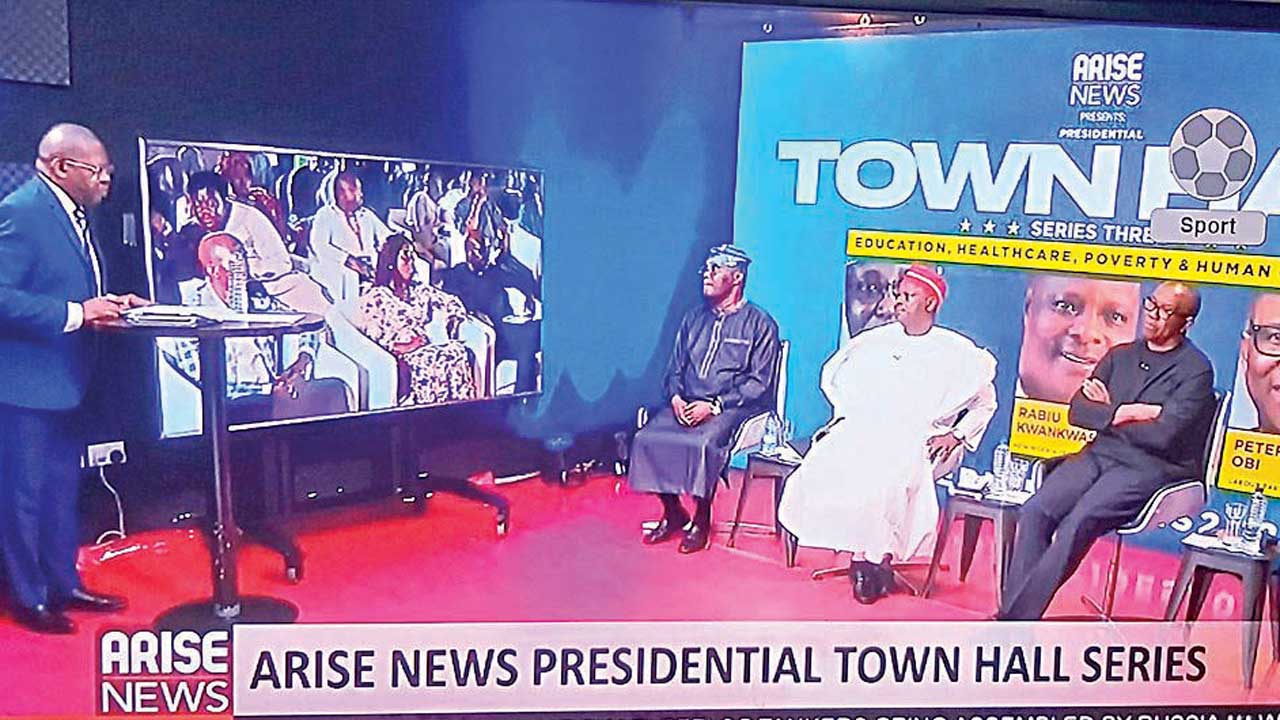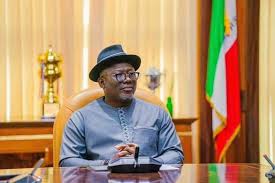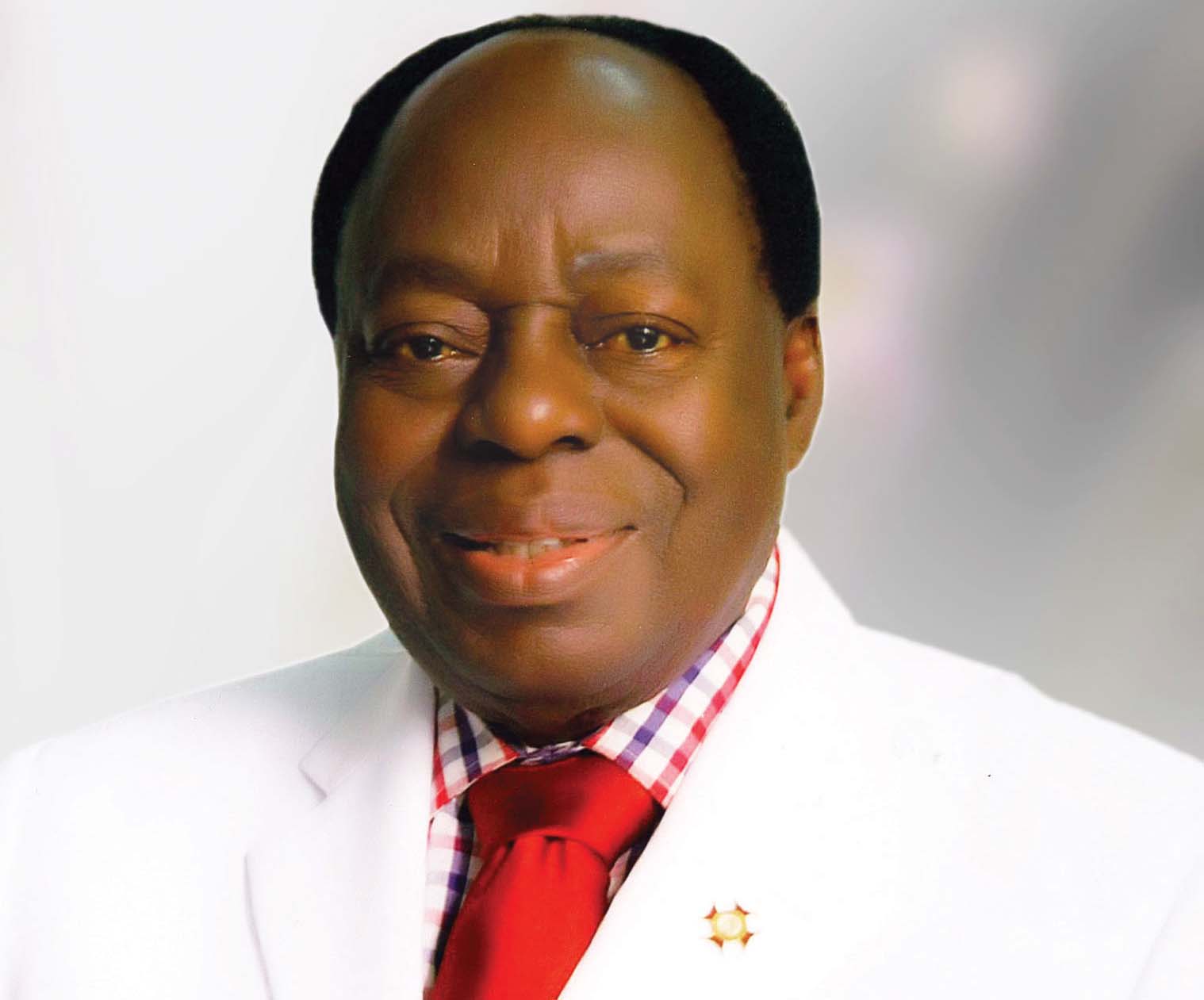Headlines
Tinubu absent as Atiku, Obi, Kwankwaso spar at Arise TV debate

As previously stated, presidential candidate of the All Progressives Congress (APC), Asiwaju Bola Tinubu, yesterday, again, shunned the Arise TV presidential debate, with candidates of the Peoples Democratic Party (PDP), Atiku Abubakar; Peter Obi of Labour Party (LP) and Rabiu Musa Kwankwaso of New Nigeria Peoples Party (NNPP) in attendance.
Tinubu, through his presidential campaign council, on Saturday, in a statement indicated that he won’t be attending any debate organised by the TV station, whom he accused of being biased against him. He also asked his supporters and spokespersons to boycott Arise TV.
The APC candidate left Nigeria on the eve of the event, just as his media team explained that he was going for an event at Chatham House, in London.
However, the trio of Atiku, Obi and Kwankwaso took turns to speak at the third series of the Arise TV Town Hall Meeting on the broad themes of education, healthcare, poverty and human capital while also fielding questions from the panelists consisting of senior journalists and development experts.
They all agreed last night that the issues of poverty reduction, healthcare, educational uplift and human capital development demands more serious attention. They also admitted that the increasing budget deficit must be tackled to allow government perform optimally, while security and proper education are required to pull Nigerians out of poverty.
Speaking on human capacity development, Atiku talked about giving incentives to the private sector to create employment. He also said he would link the labour market with the education sector.
“We have to get our kids not just educated, but rightly educated. By the time you educate them, they will be available to the private sector who should be the engine of growth. The private sector is the driver of prosperity in any given economy.”
Atiku maintained that under his administration, he would provide incentives to the private sector, most of which would go to the Small and Medium-scale Enterprises (SMEs) to encourage young people to set up businesses and grow them to create employment.
He recalled that during his time as Vice President, he commissioned a study, which proffered solutions to the high number of out-of-school children, especially in Northern Nigeria.
Atiku, however, expressed sadness that none of the Northern governors took steps to implement the report, which would have gone a long way in substantially reducing the number.
In his submission, Kwankwaso said for NNPP, education has always been key in the party’s plan to pull people out of poverty. He said: “Education has always been key for us in pulling people out of poverty. I’m not surprised that we have 133 million poor people, out of a population of 200 million.”
This, he said, would be reversed when he gets the chance to become president, noting that he did this successfully during his time as two-term governor of Kano State.
Speaking on the same subject, Obi said the Federal Government should take the lion share of the blame for the growing poverty in Nigeria. This, he said, is because it controls the issue of fiscal policy as well as security, which has degenerated to a point where farmers can no longer go to the farms.
He also lamented that investment in education has remained poor over the years. This, he said was largely responsible for falling standards and growing poverty.
The LP candidate said when compared to South Africa, Nigeria’s investment in education is abysmal.
He said: “Our investment in education is low, it is about N3.6 trillion in the last six years, which is less than 10 per cent. In South Africa, they invested about 380 trillion rands, which is about 14 to 16 per cent of their budget.”
Speaking about his plans to deal with the challenge of the scary rate of out-of-school children, especially in the North, Obi said: “Most of these children studied Quran. And if they studied the Quran, it means they are intelligent. I will meet them at this point and give them skills.”
Responding to questions on the alleged diversion of funds meant for local governments as a trigger for the mounting poverty, Atiku said: “We must look at the Constitution and determine how to ensure that local government funds are directly allocated to the LGAs and applied in the best ways possible.
“When I assumed office as VP in 1999, I was placed in charge of LG allocations. I gave instructions that all LGA funds should be transferred directly to the LGAs. After nine months, the state governments protested and said it was illegal.”
On how to reduce poverty, Atiku vowed to sustain the National Economic Empowerment and Development Strategy (NEEDS) and State Economic Empowerment and Development Strategy (SEEDS), which he said significantly reduced poverty
“I believe the programme initiated by the PDP government, which brought down the poverty rate in Nigeria, should be sustained.”
Obi described as unacceptable the increasing poverty rate, saying to tackle budget deficit, government must cut cost of governance and remove petroleum subsidy.
“The Federal Government must work seamlessly with sub-nationals for us to have a meaningful development, particularly in reducing poverty.”
He said the country has no business subsidising petrol when the health sector is in need of funding, noting that the budget for the health sector is unacceptable and must be increased to at least 10 per cent if the country wants to stop experiencing the brain drain currently marring the health sector.
He emphasised that as opposed to investing in petroleum consumption, government needs to focus on more critical areas such as health, education and fighting poverty.
His words: “These are areas where you have to do subsidy not in petroleum consumption. There are areas where government do subsidies and it is for productive and development areas that are critical like health, education, fighting poverty. These areas are where you need to invest, so, there is need for fiscal package to support the insurance, which will allow them to treat high to low diseases. It’s been done in Indonesia, in India, I will show you big nations that are practising it. We don’t need to reinvent the wheel, we just need to learn what is being practiced somewhere and do the same.”
On how to revive the health sector, Kwankwaso said: “Leaders should cultivate the habit of patronising our local health system, rather than going abroad.”
The NNPP presidential candidate assured that his government would not allow governors to suffocate the local governments financially if elected.
Kwankwaso noted that there was a need to look at the Constitution to ensure provisions could be made whereby local government authorities can get their money derived from the Federation Account directly.
Headlines
Noble Ladies Champion Women’s Financial Independence at Grand Inauguration in Abuja

Women from diverse backgrounds across Nigeria and beyond gathered at the Art and Culture Auditorium, Abuja, for the inauguration and convention of the Noble Ladies Association. The event, led by the association’s Founder and “visionary and polished Queen Mother,” Mrs. Margaret Chigozie Mkpuma, was a colourful display of feminine elegance, empowerment, and ambition.
The highly anticipated gathering, attended by over 700 members and counting, reflected the association’s mission to help women realise their potential while shifting mindsets away from dependency and over-glamorization of the ‘white collar job.’ According to the group, progress can be better achieved through innovation and creativity. “When a woman is able to earn and blossom on her own she has no reason to look at herself as a second fiddle,” the association stated.
One of the association’s standout initiatives is its women-only investment platform, which currently offers a minimum entry of ₦100,000 with a return of ₦130,000 over 30 days—an interest rate of 30 percent. Some members invest as much as ₦1 million, enjoying the same return rate. Mrs. Mkpuma explained that the scheme focuses on women because “women bear the greater brunt of poverty” and the platform seeks “to offer equity in the absence of economic equality.”
Education is also central to the Noble Ladies’ mission, regardless of age. Their mantra, “start again from where you stopped,” encourages women to return to school or upgrade their skills at any stage in life. The association believes that financial stability is vital in protecting women from cultural practices that dispossess widows of their late husbands’ assets, while also enabling them to raise morally and socially grounded families.
Founded on the vision of enhancing women’s skills and achieving financial stability, the association rests on a value system that discourages pity and promotes purpose. “You have a purpose and you build on that purpose to achieve great potentials and emancipation,” Mrs. Mkpuma said.
A criminologist by training and entrepreneur by practice, she cautions against idleness while waiting for formal employment. “There are billions in the informal and non-formal sectors waiting to be made,” she said, rejecting the “new normal of begging” and urging people to “be more introspective to find their purpose in life and hold on to it.”
Mrs. Mkpuma’s management style keeps members actively engaged, focusing on vocational skills and training to prepare them for competitive markets. She is exploring “innovative integration of uncommon technologies” and is already in talks with international franchises to invest in Nigeria, with Noble Ladies as first beneficiaries.
The association’s core values include mutual respect, innovation, forward-thinking, equal opportunity, and financial emancipation. With plans underway to establish a secretariat in the heart of Abuja, the group aims to expand its impact.
The event drew high-profile guests, including former Inspector General of Police, Mike Okiro, and a host of VIPs, marking a significant milestone in the association’s drive for women’s empowerment.
Headlines
NEPZA, FCT agree to create world-class FTZ environment

The Nigeria Export Processing Zones Authority (NEPZA) has stepped in to resolve the dispute between the Federal Capital Territory Administration and the Abuja Technology Village (ATV), a licensed Free Trade Zone, over the potential revocation of the zone’s land title.
Dr. Olufemi Ogunyemi, the Managing Director of NEPZA, urged ATV operators and investors to withdraw the lawsuit filed against the FCT administration immediately to facilitate a roundtable negotiation.
Dr. Ogunyemi delivered the charge during a courtesy visit to the Minister of the Federal Capital Territory, Barrister Nyesom Wike, on Thursday in Abuja.
You will recall that the ATV operators responded to the revocation notice issued by the FCT administration with a lawsuit.
Dr. Ogunyemi stated that the continued support for the growth of the Free Trade Zones Scheme would benefit the nation’s economy and the FCT’s development, emphasizing that the FCT administration recognized the scheme’s potential to accelerate industrialisation.
Dr. Ogunyemi, also the Chief Executive Officer of NEPZA, expressed his delight at the steps taken by the FCT minister to expand the economic frontier of the FCT through the proposed Abuja City Walk (ACW) project.
Dr. Ogunyemi further explained that the Authority was preparing to assess all the 63 licensed Free Trade Zones across the country with the view to vetting their functionality and contributions to the nation’s Foreign Direct Investment and export drives.
“I have come to discuss with His Excellency, the Minister of the Federal Capital Territory on the importance of supporting the ATV to succeed while also promoting the development of the Abuja City Walk project. We must work together to achieve this for the good of our nation,” he said.
On his part, the FCT Minister reiterated his unflinching determination to work towards President Bola Ahmed Tinubu’s Renewed Hope Agenda by bringing FDI to the FCT.
“We must fulfil Mr. President’s promises regarding industrialization, trade, and investment. In this context, the FCT will collaborate with NEPZA to review the future of ATV, a zone that was sponsored and supported by the FCT administration,” Wike said.
Barrister Wike also said that efforts were underway to fast-track the industrialisation process of the territory with the construction of the Abuja City Walk.
The minister further said the Abuja City Walk project was planned to cover over 200 hectares in the Abuja Technology Village corridor along Airport Road.
According to him, the business ecosystem aimed to create a lively, mixed-use urban center with residential, commercial, retail, hospitality, medical, and institutional facilities.
He added that the ACW would turn out to be a high-definition and world-class project that would give this administration’s Renewed Hope Agenda true meaning in the North-Central Region of the country.
Barrister Wike also indicated his continued pursuit of land and property owners who failed to fulfil their obligations to the FCT in his determination to develop the territory.
Headlines
Benue IDPs block highway, demand return to ancestral homes

Vehicular movement along the Yelwata axis of the Benue–Nasarawa highway was brought to a standstill on Wednesday as Internally Displaced Persons, IDPs, staged a protest, demanding immediate return to their ancestral homes.
The protesters, believed to be victims of persistent attacks by suspected herdsmen, blocked both lanes of the busy highway for several hours, chanting “We want to go back home”.
The protest caused disruption, leaving hundreds of motorists and passengers stranded.
Eyewitnesses said the displaced persons, many of whom have spent years in overcrowded IDP camps, are expressing deep frustration over the government’s delay in restoring security to their communities.
“We have suffered enough. We want to return to our homes and farms,” one of the protesters told reporters at the scene.
Security personnel were reportedly deployed to monitor the situation and prevent any escalation, though tensions remained high as of press time.
Efforts to reach the Benue State Emergency Management Agency, SEMA, and other relevant authorities for comment were unsuccessful.
-

 Headlines4 years ago
Headlines4 years agoFacebook, Instagram Temporarily Allow Posts on Ukraine War Calling for Violence Against Invading Russians or Putin’s Death
-

 Headlines4 years ago
Headlines4 years agoNigeria, Other West African Countries Facing Worst Food Crisis in 10 Years, Aid Groups Say
-

 Foreign3 years ago
Foreign3 years agoNew York Consulate installs machines for 10-year passport
-

 News1 year ago
News1 year agoZero Trust Architecture in a Remote World: Securing the New Normal
-

 Entertainment3 years ago
Entertainment3 years agoPhyna emerges winner of Big Brother Naija Season 7
-

 Headlines1 year ago
Headlines1 year agoNigeria Customs modernisation project to check extortion of traders
-

 Entertainment2 years ago
Entertainment2 years agoMovie download platform, Netnaija, announces closure
-

 Economy2 years ago
Economy2 years agoWe generated N30.2 bn revenue in three months – Kano NCS Comptroller














